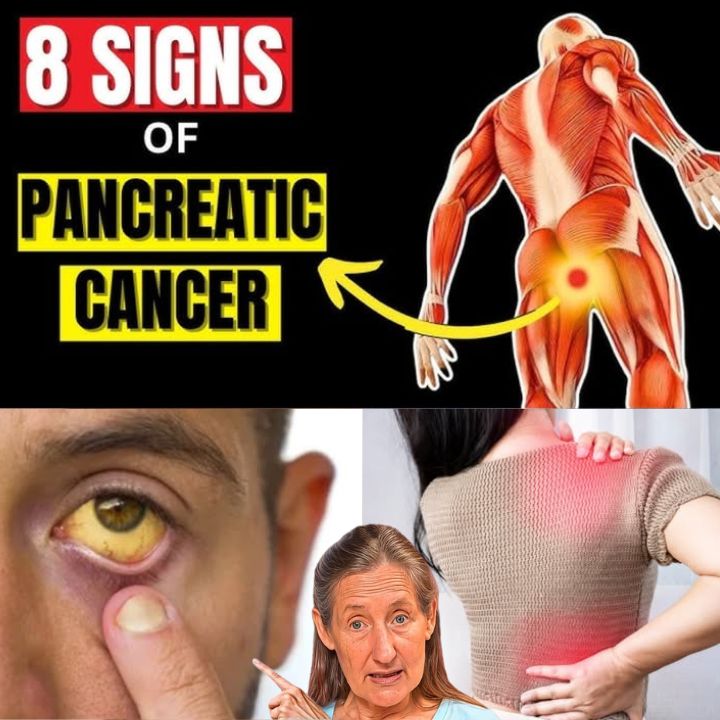Why Does This Happen?
Pancreatic tumors can interfere with the production of enzymes that help digest food. This results in poor absorption of nutrients, causing your body to lose weight.
Additionally, cancer can reduce your appetite or increase your body’s metabolic rate, meaning your body burns more calories even when resting. These combined effects often lead to rapid weight loss.
💛 2. Yellowing of the Skin or Eyes (Jaundice)
A Visible Sign You Shouldn’t Ignore
One of the most noticeable symptoms of pancreatic cancer is jaundice, which causes a yellow tint to your skin and the whites of your eyes. Although jaundice can be caused by other liver or bile duct problems, it is commonly linked to pancreatic tumors.
If you or someone you know develops yellow skin or eyes, it is crucial to seek medical attention promptly to rule out serious conditions like pancreatic cancer.
What Causes Jaundice in Pancreatic Cancer?
Tumors near the head of the pancreas can block the bile duct, which normally carries bile from the liver to the intestines. When this duct is obstructed, bile builds up in the bloodstream, causing yellow discoloration.
Other symptoms often appearing with jaundice include dark urine and pale stools. These signs together are serious and require immediate evaluation.
🔥 3. Persistent Abdominal or Back Pain
Discomfort That Shouldn’t Be Ignored
Pain in the upper abdomen or middle back is a common but often overlooked warning sign. This pain may start as a dull ache and gradually worsen over time. Many people dismiss this pain as indigestion or muscle strain.
If the pain is persistent and radiates to your back, especially if it gets worse after eating or when lying down, it should not be ignored.
What Does This Pain Feel Like?
Typically, the pain begins in the abdomen and may spread to the back, feeling like a constant ache. It may become more intense over weeks or months.
Such pain results from the tumor pressing on nerves or organs near the pancreas. Early reporting of this symptom can aid in quicker diagnosis.
🤢 4. Digestive Discomfort, Nausea, or Bloating
Trouble With Digestion
Pancreatic cancer can disrupt normal digestion. Tumors may affect enzyme secretion, which is essential for breaking down food. This leads to symptoms like nausea, bloating, and frequent indigestion.
Persistent digestive issues that don’t improve over time should be checked by a doctor to identify the underlying cause.
Additional Digestive Signs to Watch For
You may notice fatty or floating stools, which happen because fat isn’t properly digested. Changes in bowel habits, like diarrhea or constipation, can also occur.
A constant feeling of fullness or stomach discomfort without eating much food is another sign. Don’t ignore new or ongoing digestive problems.
🩺 5. Sudden Onset of Type 2 Diabetes
An Unexpected Symptom
The pancreas plays a key role in controlling blood sugar by producing insulin. When a tumor interferes with this function, it can trigger new cases of type 2 diabetes, even in people without previous risk factors.
If you suddenly develop high blood sugar or diabetes symptoms, it’s important to investigate pancreatic health.
What to Look For
Sudden increases in thirst, frequent urination, unusual fatigue, and blurred vision are common diabetes symptoms. If these appear unexpectedly, especially without a family history, speak to your doctor about pancreatic screening.
Recognizing this connection early can help in diagnosing pancreatic cancer sooner.
🟤 6. Dark-Colored Urine and Pale or Greasy Stools
Changes in Body Waste Can Be Telling
Dark urine and pale or greasy stools are less well-known but significant signs of pancreatic cancer. These changes often result from bile duct obstruction caused by the tumor.
Noticing such changes should prompt a medical consultation as they may indicate serious underlying problems.
Specific Symptoms to Notice
Dark urine may appear tea or cola colored due to excess bile in the bloodstream. Meanwhile, stools might look pale, grayish, or greasy, and they can be difficult to flush.
Itchy skin can also occur from bile salt buildup. These seemingly unrelated symptoms should not be ignored.
😴 7. Ongoing Fatigue or Weakness
When Rest Doesn’t Help
Feeling exhausted despite getting enough sleep can be an early warning sign of pancreatic cancer. Fatigue is common in many chronic diseases, including cancer, because the body is fighting off illness.
